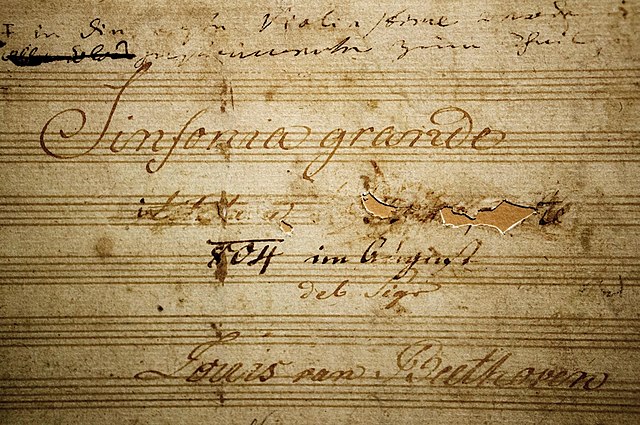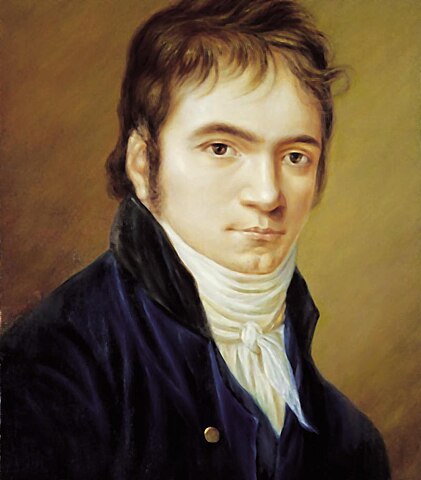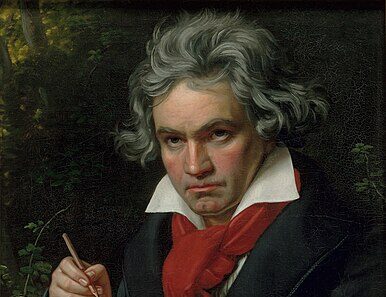Life and Important Facts about Composer Ludwig van Beethoven from our Know the Great Composers and Classical Musicians Series.
About Ludwig van Beethoven
Ludwig van Beethoven was a German composer and pianist who lived from 1770 to 1827. He is widely regarded as one of the greatest composers of all time, and his music is a bridge between the Classical and Romantic eras of Western music.
His early life
Beethoven was born in Bonn, Germany, on December 16, 1770. He was baptized on December 17, and his exact date of birth is unknown. His grandfather, also named Ludwig van Beethoven, was a respected musician and the director of music at the court of the Archbishop-Elector of Cologne in Bonn. His father, Johann van Beethoven, was a singer and instrumentalist at the same court, but he was also an alcoholic and abusive to his family. Beethoven had six younger siblings, but only two survived to adulthood.
Beethoven showed musical talent from an early age, and his father tried to exploit him as a child prodigy. He gave him harsh and intensive lessons, often beating him or locking him in a cellar. Beethoven later said that his father’s treatment had made him “a little hard-hearted.” He also received some instruction from his grandfather’s successor, Christian Gottlob Neefe, who was more supportive and encouraging. Neefe taught him piano, organ, and composition, and helped him publish his first work, a set of keyboard variations, in 1783.
Fun facts
- Beethoven loved nature and often took long walks in the countryside. He composed his Sixth Symphony (the Pastoral) as an expression of his feelings for nature.
- Beethoven had a strong sense of humor and liked to play practical jokes on his friends. He once pretended to be deaf when a visitor came to see him, and then shouted “I can hear!” when the visitor left.
- Beethoven had a pet dog named Pumpernickel, who was a mongrel with some poodle in him. He was very fond of him and often took him along on his walks.
- Beethoven had a habit of dipping his head in cold water before composing. He believed that this stimulated his brain and helped him focus.
- Beethoven was very messy and disorganized. His rooms were always cluttered with papers, books, clothes, dishes, and musical instruments. He often forgot to pay his bills or change his clothes.
- Beethoven initially intended to dedicate his third symphony, the “Eroica,” to Napoleon Bonaparte, but scratched out the dedication when he learned that Napoleon had declared himself emperor.

Important achievements
Beethoven composed over 600 works in various genres, including symphonies, concertos, sonatas, string quartets, operas, songs, and choral works. He is especially known for his nine symphonies, which are considered masterpieces of orchestral music. Some of his most famous works include:
- The Fifth Symphony (1808), which begins with the famous four-note motif that Beethoven said represented “fate knocking at the door.”
- The Ninth Symphony (1824), which features a choral finale based on Friedrich Schiller’s poem “Ode to Joy.” It was the first symphony to include vocal parts.
- The Moonlight Sonata (1801), a piano sonata that has a haunting and melancholic first movement.
- The Emperor Concerto (1811), a piano concerto that showcases Beethoven’s virtuosity and heroic style.
- The Fidelio (1814), an opera that tells the story of a woman who disguises herself as a prison guard to rescue her husband from political oppression.
- The Missa Solemnis (1823), a mass that expresses Beethoven’s spiritual vision and musical innovation.
What we can learn from Ludwig van Beethoven
Beethoven’s life and music are inspiring examples of overcoming adversity and pursuing one’s passion. Despite losing his hearing gradually from his late twenties until he became completely deaf in his forties, he continued to compose music that expressed his emotions and ideals. He faced many personal challenges, such as poverty, ill health, family troubles, unrequited love, and political turmoil, but he never gave up on his artistic vision. He also challenged the conventions of his time and experimented with new forms and techniques that influenced generations of composers after him.

What students can learn from Ludwig van Beethoven
Students can learn many valuable lessons from studying Beethoven’s music and biography. Some of these are:
- Creativity: Beethoven was not afraid to try new things and explore different possibilities in his music. He invented new musical structures, combined different genres, used unusual instruments, and created original melodies and harmonies.
- Expression: Beethoven used music as a way of communicating his feelings and thoughts to others. He conveyed a wide range of emotions in his music, from joy and hope to anger and despair. He also expressed his views on social issues such as freedom, justice, and human dignity.
- Perseverance: Beethoven faced many obstacles and difficulties in his life, but he never gave up on his goals and dreams. He worked hard and diligently to improve his skills and complete his projects. He also coped with his deafness by using ear trumpets, conversation books, and musical sketches.
- Appreciation: Beethoven loved and appreciated music as a gift and a source of joy. He also appreciated nature, art, literature, and friendship as enriching aspects of life. He was grateful for the support and patronage of his friends and admirers.
Images: From Public Domain
MusicLesson.In is a top standard online music academy from India. At our online studio, students and tutors from different geographical backgrounds share a vibrant online community thriving with musical artistry, practical expedients, structural learning methods, also emphasizing out-of-the-box creative opportunities. At www.musiclesson.in our pledge is to provide a world-class music learning experience, and adequate knowledge on the subject to our students. We inspire the learners to love music and be passionate about what they are doing. Moreover, our digital lesson-booking system makes things extremely user-friendly, convenient, and easily accessible. Join us and experience thorough professionalism at www.musiclesson.in and visit our Facebook Page Here
The bio and booking colander links of our amazing tutors from India are given below.


Recent Comments